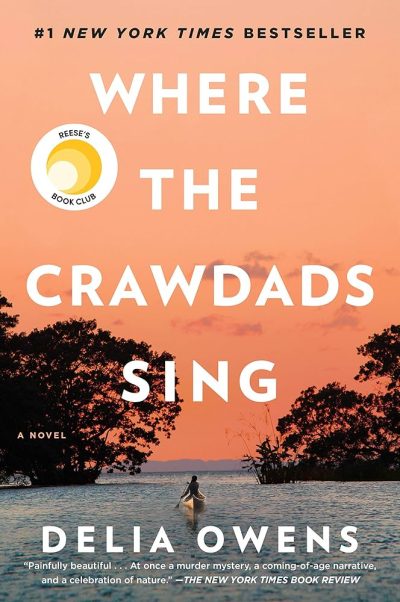Where the Crawdads Sing is a crime novel built upon elements of Southern Gothic, coming-of-age, and romance. Delia Owens blends this concoction of literary ingredients into a narrative I did not want to let go of, surrounding a character I would die for.
Kya Clark, a ten-year-old girl, lives alone in the marshes of North Carolina, abandoned by her family and shunned by her small town as trash. Without school, a job, or friends, Kya only has the marsh to turn to, leading to a fascination with the other marsh-dwelling creatures. The gulls become her friends, the waves her teachers, and the sand her home. Kya’s connection with the marsh runs deep, but it is not enough; her desire for human connection draws her towards the townspeople whom she could never trust. In finding love, Kya opens herself up to new possibilities for an integrated life. The choice is stolen from her when the golden boy of the town is found dead in the marsh, and Kya, the so-called “Marsh Girl,” is thrust into the town’s spotlight as fingers start pointing. Battling a town riddled with prejudice and a taste for vengeance, Kya must protect herself and find her way back to the marsh, the best friend she’s ever known.
The organization of the novel actively captures your attention and twists with tension through multiple storylines: one that follows Kya growing up to a young adult and another that watches the detectives solving the murder. The first occupies the majority of the novel and moves faster. This plot drops clues to the reader before eventually catching up to the investigation at its pinnacle. In doing so, minor conflicts are resolved without any release of tension as the murder looms in the background, tainting any short-lived happiness I felt for Kya. Then, the ending fulfills every promise made, leaving a well-rounded and developed piece of art.
As a lazy, unmotivated reader, I can boldly say this book will make you READ. Despite its meandering pace, I didn’t want to stop. I immediately fell in love with the neglected, poor, abandoned child, essentially raised by the marsh; it’s hard not to. Her perseverance following a childhood of neglect and abuse and her brilliance without schooling shine so bright I could only wish the best for her. As I watched her grow older, my heart ached for the townspeople to see the same girl I could while they dismissed her as marsh trash. She lives a different life than I do, yet she is as real and relatable as they come, demanding my emotions match her own. By attaining your empathy early on, Kya grows into the badass woman she is with your full support.
My favorite part of the book is the innate connection to nature pulsing throughout. Before writing this debut novel, Delia Owens lived in Africa for twenty-three years, studying the exceptional animal kingdom and environment that the Sahara offers. Her experiences and knowledge snake through the novel, breaking up intense scenes of Kya’s pain with her deep respect for and study of the world around her. Though I have little to no interest in nonfictional writing, these veins of concrete information brought this setting to life, making the disconnected lifestyle of a marsh girl feel as natural as the mating patterns of a firefly.
If you are able to give yourself wholly to a novel, implausibilities and all, this one rewards. It takes a level of suspension of disbelief to allow the Marsh Girl, a mere child, to live on her own and achieve the success in life that she does. But once allowed, this novel will call upon your every emotion as it draws attention to the dangers of prejudice and isolation, especially on children. The tension of fear for Kya’s future keeps you flipping the pages, even through some slow periods of prose. While it may not be a forever novel, the compulsion of The Marsh Girl makes this book a must-read.
Rating: 4 of 5 stars
CW: contains child abuse and a scene of attempted sexual assault.

